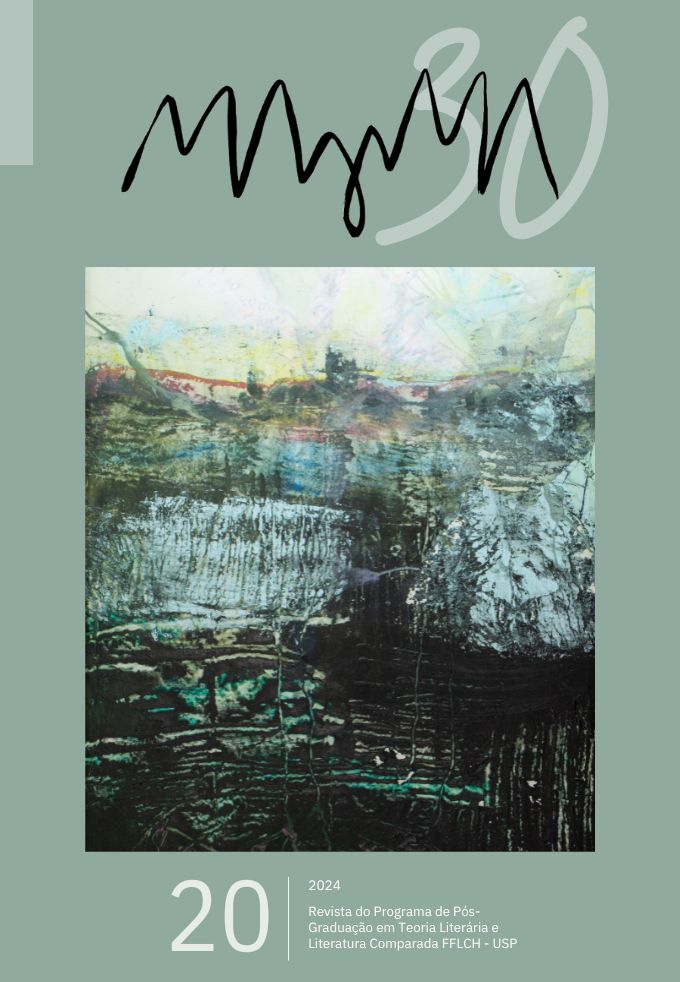O narrador paraléptico em “Baster”, de Jeffrey Eugenides
DOI:
https://doi.org/10.11606/issn.2448-1769.mag.2024.223041Palavras-chave:
Literatura americana, Narratologia não-natural, ParalepseResumo
O presente artigo desenvolve um estudo acerca da narração paraléptica em “Baster”, conto do escritor americano Jeffrey Eugenides. Para fins de análise, serão abordadas contribuições da área da teoria da narrativa, com ênfase no campo da narratologia “não-natural”. Argumenta-se a narração em primeira pessoa do conto de Eugenides transgride a noção de consistência epistêmica, posto que o narrador-protagonista demonstra ter um conhecimento onisciente, narrando eventos dos quais não participou e ocasionalmente acessando a mente de outros personagens. Por meio da análise da paralepse em “Baster”, este estudo propõe possíveis caminhos interpretativos para esse fenômeno na ficção, valendo-se, em particular, da tipologia de narradores paralépticos desenvolvida pelo teórico literário Rüdiger Heinze e das contribuições de autores como Brian Richardson, Jan Alber, Henrik Skov Nielsen e Gérard Genette.
Downloads
Referências
ALBER, Jan. Impossible storyworlds—and what to do with them. Storyworlds: A Journal of Narrative Studies, v. 1, 2009, pp. 79-96.
ALBER, Jan. The diachronic development of unnaturalness: A new view on genre. In: ALBER, Jan; HEINZE, Rüdiger (eds.). Unnatural narratives - unnatural narratology. Berlim: Walter de Gruyter, 2011, pp. 41-67.
ALBER, Jan; HEINZE, Rüdiger. Introduction. In: ALBER, Jan; HEINZE, Rüdiger (eds.). Unnatural narratives - unnatural narratology. Berlim: Walter de Gruyter, 2011, p. 1-19.
EUGENIDES, Jeffrey. Baster. In: EUGENIDES, Jeffrey. Fresh complaint. Nova Iorque: Farrar, Straus and Giroux, 2017, pp. 63-82.
GENETTE, Gérard. Figuras III. 1a ed. São Paulo: Editora Estação Liberdade, 2017.
HEINZE, Rüdiger. Violations of mimetic epistemology in first-person narrative fiction. Narrative, v. 16, n. 3, 2008, pp. 279-297.
JAHN, Manfred. Narratology: A guide to the theory of narrative. English Department, University of Cologne, 2017. Disponível em: http://fdjpkc.fudan.edu.cn/_upload/article/files/a7/fc/a02b49ac4485ac0109d7f9167289/0cef85a3-0b78-4bf8-8fa2-f2e8e57f5092.pdf. Acesso em: 12 de mar. 2024.
MARGOLIN, Uri. Narrator. In: HÜHN, Peter; PIER, John; SCHMID, Wolf; SCHÖNERT, Jörg (eds.). Handbook of Narratology. Berlim: Walter de Gruyter, 2014.
MENDES, Gabriella Campos. “O insignificante é o crime”: Sobre o romance de enigma e o não-natural em O Delfim. Abusões, v. 13, n. 13, pp. 91-114, 2020.
NIELSEN, Henrik Skov. Fictional Voices? Strange Voices? Unnatural Voices? In: HANSEN, Per Krogh; IVERSEN, Stefan; NIELSEN, Henrik Skov; REITAN, Rolf (eds.). Strange voices in narrative fiction. Berlim: Walter de Gruyter, 2011, pp. 55-82.
OLSON, Greta. Reconsidering unreliability: Fallible and untrustworthy narrators. Narrative, v. 11, n. 1, 2003, pp. 93-109.
RICHARDSON, Brian. Unnatural voices: Extreme narration in modern and contemporary fiction. Columbus: The Ohio State University Press, 2006.
RICHARDSON, Brian. What is unnatural narrative theory? In: ALBER, Jan; HEINZE, Rüdiger (eds.). Unnatural narratives - unnatural narratology. Berlim: Walter de Gruyter, 2011, pp. 23-40.
Downloads
Publicado
Edição
Seção
Licença
Copyright (c) 2024 Bruno Konkewicz

Este trabalho está licenciado sob uma licença Creative Commons Attribution-NonCommercial-NoDerivatives 4.0 International License.
Autores que publicam nesta revista concordam com os seguintes termos:
- Autores mantém os direitos autorais e concedem à revista o direito de primeira publicação, com o trabalho simultaneamente licenciado sob a Licença Creative Commons Attribution CC-BY-NC-ND que permite o compartilhamento do trabalho com reconhecimento da autoria e publicação inicial nesta revista.
- Autores têm autorização para assumir contratos adicionais separadamente, para distribuição não-exclusiva da versão do trabalho publicada nesta revista (ex.: publicar em repositório institucional ou como capítulo de livro), com reconhecimento de autoria e publicação inicial nesta revista.
- Autores têm permissão e são estimulados a publicar e distribuir seu trabalho online (ex.: em repositórios institucionais ou na sua página pessoal) a qualquer ponto antes ou durante o processo editorial, já que isso pode gerar alterações produtivas, bem como aumentar o impacto e a citação do trabalho publicado (Veja O Efeito do Acesso Livre).



